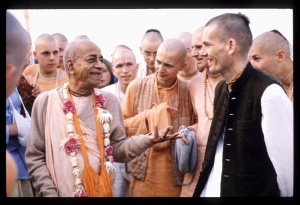CC Antya 4.194

A.C. Bhaktivedanta Swami Prabhupada
TEXT 194
- martyo yadā tyakta-samasta-karmā
- niveditātmā vicikīrṣito me
- tadāmṛtatvaṁ pratipadyamāno
- mayātma-bhūyāya ca kalpate vai
SYNONYMS
martyaḥ — the living entity subjected to birth and death; yadā — as soon as; tyakta — giving up; samasta — all; karmāḥ — fruitive activities; nivedita-ātmā — a fully surrendered soul; vicikīrṣitaḥ — desired to act; me — by Me; tadā — at that time; amṛtatvam — immortality; pratipadyamānaḥ — attaining; mayā — with Me; ātma-bhūyāya — for becoming of a similar nature; ca — also; kalpate — is eligible; vai — certainly.
TRANSLATION
“‘The living entity who is subjected to birth and death attains immortality when he gives up all material activities, dedicates his life to the execution of My order, and acts according to My directions. In this way he becomes fit to enjoy the spiritual bliss derived from exchanging loving mellows with Me.’
PURPORT
This is a quotation from Śrīmad-Bhāgavatam (SB 11.29.34). At the time of initiation, a devotee gives up all his material conceptions. Therefore, being in touch with the Supreme Personality of Godhead, he is situated on the transcendental platform. Thus having attained knowledge and the spiritual platform, he always engages in the service of the spiritual body of Kṛṣṇa. When one is freed from material connections in this way, his body immediately becomes spiritual, and Kṛṣṇa accepts his service. However, Kṛṣṇa does not accept anything from a person with a material conception of life. When a devotee no longer has any desire for material sense gratification, in his spiritual identity he engages in the service of the Lord, for his dormant spiritual consciousness awakens. This awakening of spiritual consciousness makes his body spiritual, and thus he becomes fit to render service to the Lord. Karmīs may consider the body of a devotee material, but factually it is not, for a devotee has no conception of material enjoyment. If one thinks that the body of a pure devotee is material, he is an offender, for that is a vaiṣṇava-aparādha. In this connection one should consult Śrīla Sanātana Gosvāmī’s Bṛhad-bhāgavatāmṛta (1.3.45 and 2.3.139).